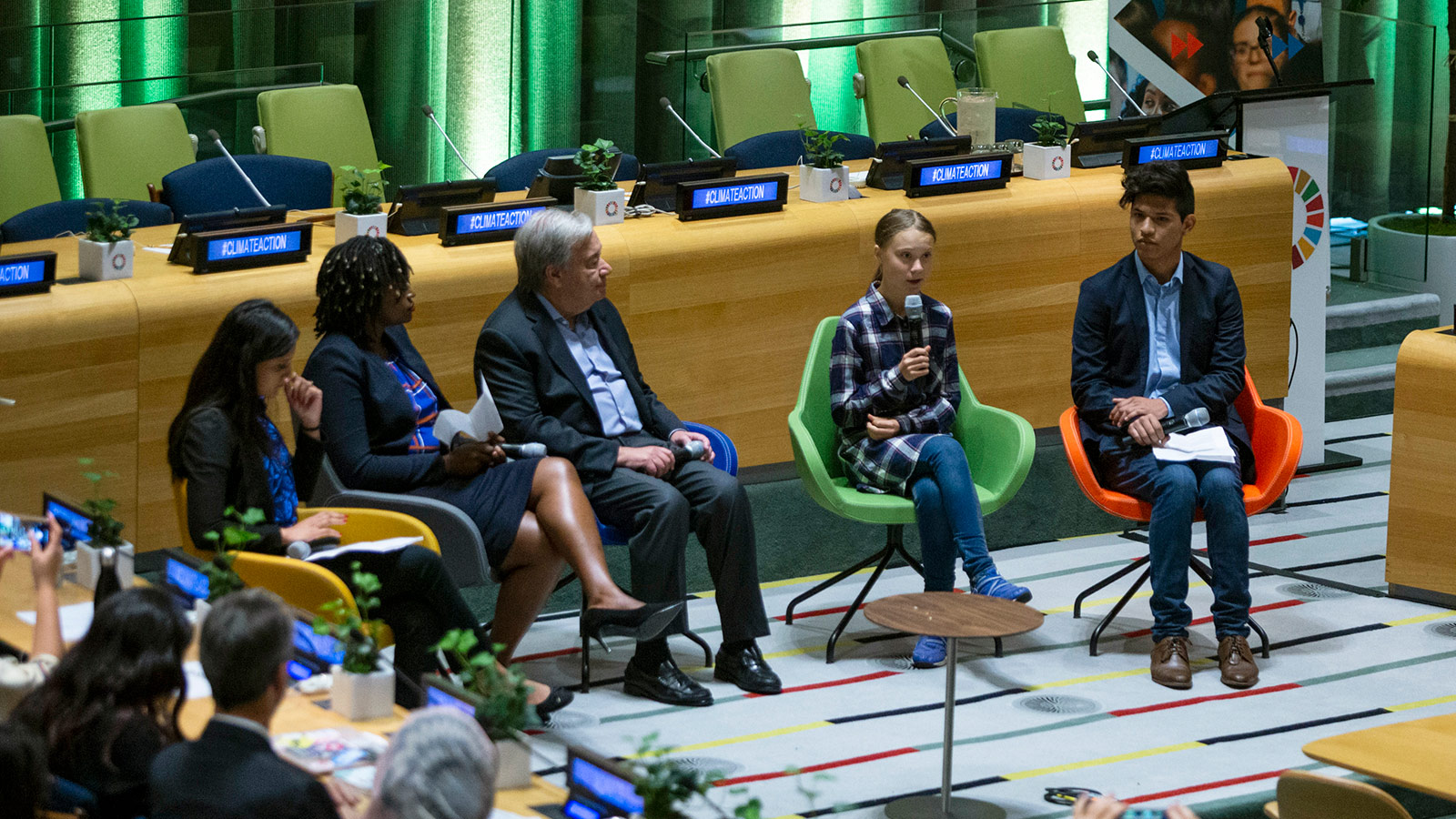Less than 24 hours after young people took to the streets for what was probably the largest climate protest in history, hundreds of youth organizers and young environmental leaders from around the world were up bright and early Saturday morning at the U.N. headquarters in New York City for the first-ever Youth Climate Summit.
A few notable names such as Greta Thunberg, Jamie Margolin, Alexandria Villaseñor, and Isra Hirsi held court in busy U.N. halls and chambers, giving media interviews and demanding that world leaders take climate action. But in quieter corners of the U.N. complex, where people weren’t flocking, Grist spoke to a handful of unknown Gretas who are fighting no less vigorously than Thunberg for climate action.
Sixteen-year-old Manal Bidar, a climate activist from Morocco, said she’s been fighting for the climate since she was little. In 2016, she organized her first ever climate strike, but neither the media nor Moroccan leaders paid attention to her. Now, she works with other Moroccan youth, organizing climate strikes and leading recycling workshops.
“I like to call myself a climate activist, a climate fighter, because I believe that it is our duty as youth to fight for the climate,” Bidar said. “If we don’t fight for the climate, then who will?”
Not all the kids at the Youth Climate Summit were activists — some of them were entrepreneurs. Melati Wijsen, an 18-year-old from the island of Bali in Indonesia, is working with her sister to reduce plastic use on their home island.
“We realized that we didn’t have to wait until we were older to start making a difference,” said Wijsen. The sisters came up with the idea for their business when they were little: They gather old bed sheets from hotels such as the Hilton and turn them into tote bags to reduce the use of plastic bags.
“One thing I would say to our politicians is that we need to invest in our people,” she said. “Coming from the younger generation, I’ve seen so many bright, young entrepreneurs who are just waiting to be plugged in, and we need the attention of the government in a more serious level to invest in us.”
After a day of speeches and workshops, the summit culminated in the Intergenerational Town Hall, a jam-packed event meant to be a platform for young people from more than 140 counties to ask high-level officials unfiltered questions. And boy, did they have questions.
A young activist from Chad asked U.N. leaders about the country’s vanishing lake, Lake Chad, a source of food, water, and income for neighboring communities. Once one of Africa’s largest lakes, Lake Chad has shrunk by around 90 percent since the 1960s. Amina J. Mohammed, the U.N.’s deputy secretary-general, said that solutions exist — such as a multi-million dollar fund to curtail militant groups like Boko Haram, which exacerbate climate change’s effects on the river — but progress has been slow. “Thank you for putting Lake Chad back on the map — it was crying for it,” she added.
Some of the summit’s attendees were not in the mood for those kinds of pats on the back. Swetha Saseedhar, a teen activist from the New York City-based advocacy group SustainUS, asked U.N. officials whether the youth summit amounted to greenwashing. “What is the purpose of this Youth Summit if two days from now you are letting fossil fuel corporations take the stage along with member nations and allowing them to influence climate policy when they are the ones who created this crisis?” (Fossil fuel executives dined with government officials at the Gramercy Park Hotel in New York Sunday night.) Saseedhar added that the day’s events seemed like a “photo op.”
Then other attendees from the SustainUS delegation broke out in song: “The emergency is now; time to kick polluters out!” Washington governor and former presidential candidate Jay Inslee, who participated in the Intergenerational Town Hallas the self-described “oldest kid climate striker in America,” agreed with the activists. The 68-year-old told the audience that we need to “cut off the fossil fuel industry and their ability to influence our democracy.”
All in all, the summit made it clear that the youth climate movement is not just about marches and strikes. The Youth Climate Summit attendees are interested in taking action on climate change by any and every means possible — as Thunberg and 15 other youth activists made clear on Monday morning when they filed a landmark lawsuit against five countries in the name of children’s rights. Today’s youth activists aren’t just asking for power; they’re demanding it.
“I’m here to tell you government leaders to trust us,” said Bidar. “We as young leaders have the power to make a change, the power to make decisions, and the power to decide for our future, so please give us a chance and please trust in our potential.”



